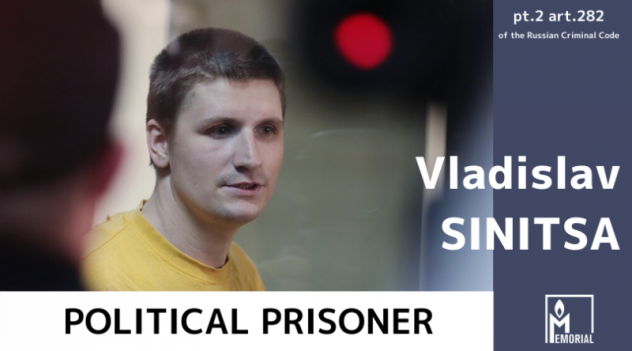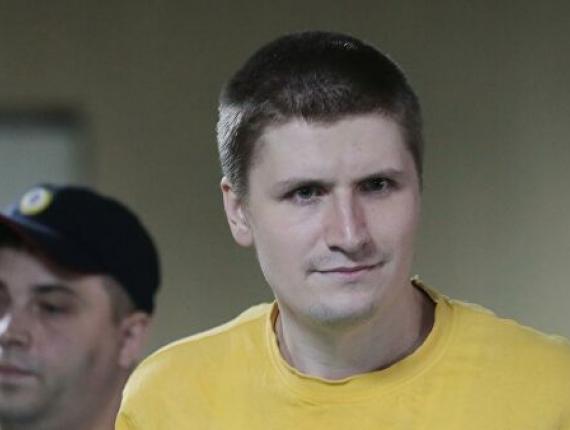Memorial Recognises Blogger Vladislav Sinitsa as a Political Prisoner
Sinitsa has been sentenced to five years in a penal colony for a comment on Twitter
The Memorial Human Rights Centre has announced that Vladislav Sinitsa, a blogger from Moscow Oblast known by the pseudonym Max Steklov, is a political prisoner. On 3 August 2019 Sinitsa was detained on charges of inciting hatred and hostility and threatening use of force. On 3 September this year he was sentenced to five years in a general-regime penal colony for an offence under Point ‘a’ of Part Two of Article 282 of the Russian Criminal Code. The reason for Sinitsa’s prosecution was a comment he posted on Twitter. Memorial considers the comment inappropriate and in bad taste, but, however, does not consider it incites hatred or hostility to law enforcement officers.
This summer there were political discussions on the internet about the exclusion of independent candidates from the Moscow city assembly elections. Moreover, the homes of Moscow activists were searched and they were summoned for questioning. Hundreds were arrested and fined while dozens were jailed for administrative offences. The severe, and at times brutal, actions of law enforcement agencies touched off public indignation. In response, there were spontaneous initiatives to identify and make public the names of officers who particularly ‘distinguished themselves.’ We believe the security services have sought to make an example of Vladislav Sinitsa as a means of ending this calling-out of officers. The trial has been intended to make an example of him and has been as repressive as possible.
On 31 July 2019 Vladislav Sinitsa wrote on Twitter: ‘They’ll look at the nice happy family photos, study the location, and then the child of the gallant defender of law and order simply won’t come home from school one day. Instead of the child they will get a packet in the post with a compact disc and a snuff video.’ The comment, in the name of ‘Max Steklov,’ was a response to the anonymous user ‘Golos Mordora’ who had expressed interest in how ‘those who support making public the names of police and riot officers who used unlawful force against protesters’ were planning on taking revenge ‘against the identified police and riot officers.’
Most internet users who discussed the brutal dispersal of the Moscow protests believed the tweet to be morally at fault. The Memorial Human Rights Centre also considers the blogger’s statements inappropriate and in bad taste, even taking into account their emotional context. However, from a legal point of view the tweet is not obviously inciting hatred or hostility towards law enforcement officers. Mention of the possibility of kidnapping children and filming a snuff video is not equivalent to incitement to such actions. The comment was in response to the tweet of an anonymous user, in other words was not intended to reach a potentially wide circle of users, as imputed by the investigation.
Having studied the materials of the criminal case, and also the publications related to it, we have concluded that the conviction of Vladislav Sinitsa is unlawful and politically motivated:
- A large-scale information campaign was initiated in pro-government media.
- Experts who were consulted in the case issued their report in just a few days. These experts had previously taken part in political trials; their qualifications are extremely dubious in nature.
- Only one month passed from the day of Sinitsa’s arrest to the handing down of the sentence.
- The trial itself lasted only one day.
- Sinitsa was given the maximum sentence possible under this article of the Russian Criminal Code.
All this confirms that actions by law enforcement agencies and the courts were coordinated, and not only supported, but also orchestrated, on the political level.
Taking into account everything said above, the Memorial Human Rights Centre, in accordance with international guidelines defining the term ‘political prisoner,’ finds the criminal case against Vladislav Sinitsa to have been politically motivated and intended to achieve the retention of power by state bodies and the forcible cessation of public activities by Sinitsa. We consider that the deprivation of liberty has been imposed on Sinitsa in violation of his right to a fair trial.
Memorial considers Vladislav Sinitsa to be a political prisoner and demands his immediate release. We also demand that investigations be conducted into the circumstances of the initiation of the case, the possibility that National Guard officers were forced to give false testimony by their senior officers, the activities of the non-profit organisation Centre of Socio-Cultural Expertise, and statements made by the head of the National Guard, Viktor Zolotov.
For more information about the position of the Memorial Human Rights Centre regarding the case of Vladislav Sinitsa, see here.
Recognition of an individual as a political prisoner, or of a prosecution as politically motivated, does not imply that the Memorial Human Rights Centre shares or approves the individual’s views, statements or actions.
You can support all political prisoners by donating to the Fund to Support Political Prisoners of the Union of Solidarity with Political Prisoners via PayPal, using the e-wallet at [email protected].





